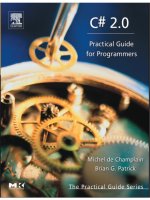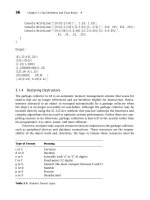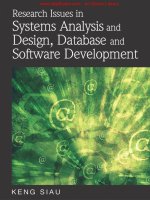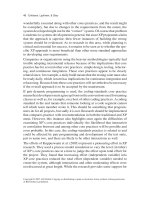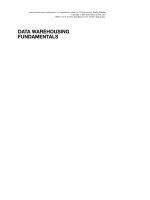Transoesophageal Echocardiography study guide and practice mcqs phần 1 docx
Bạn đang xem bản rút gọn của tài liệu. Xem và tải ngay bản đầy đủ của tài liệu tại đây (105.56 KB, 15 trang )
This page intentionally left blank
Transoesophageal Echocardiography
Transoesophageal echocardiography (TOE/TEE) in cardiac patients is
now almost routine. Its use in cardiac monitoring has also extended to
include critically ill patients for non-cardiac surgery and the intensive
care setting. Specific accreditation is required prior to practice of
TOE/TEE involving a written examination and a documented logbook
of experience. This book has been specifically designed to help
candidates pass the written exam and has been structured around the
syllabus. Providing a summary of all relevant information, this is an
invaluable study aid. Lists of further reading material are provided with
every topic, including guidelines and safety, cardiomyopathies, heart
disease, haemodynamic calculations and many more. Each chapter
ends with a series of exam-style questions for self-assessment. An
extremely useful book for trainee anaesthetists, intensivists, trainee
cardiologists and cardiac surgeons.
Andrew Roscoe is a consultant in cardiothoracic anaesthesia at
Wythenshawe Hospital in Manchester, UK.
Transoesophageal
Echocardiography
Study Guide and Practice Questions
Dr Andrew Roscoe, F.R.C.A
Consultant in Cardiothoracic Anaesthesia
Wythenshawe Hospital, Manchester, UK
CAMBRIDGE UNIVERSITY PRESS
Cambridge, New York, Melbourne, Madrid, Cape Town, Singapore, São Paulo
Cambridge University Press
The Edinburgh Building, Cambridge CB2 8RU, UK
First published in print format
ISBN-13 978-0-521-68960-1
ISBN-13 978-0-511-27815-0
© Cambridge University Press 2007
Every effort has been made in preparing this publication to provide accurate and up-to-
date information which is in accord with accepted standards and practice at the time of
publication. Although case histories are drawn fromactual cases, every effort has been made
to disguise the identities of the individuals involved. Nevertheless, the authors, editors and
publishers can make no warranties that the information contained herein is totally free
fromerror, not least because clinical standards are constantly changing through research
and regulation. The authors, editors and publishers therefore disclaimall liability for direct
or consequential damages resulting fromthe use of material contained in this publication.
Readers are strongly advised to pay careful attention to information provided by the
manufacturer of any drugs or equipment that they plan to use.
2007
Information on this title: www.cambridge.org/9780521689601
This publication is in copyright. Subject to statutory exception and to the provision of
relevant collective licensing agreements, no reproduction of any part may take place
without the written
p
ermission of Cambrid
g
e University Press.
ISBN-10 0-511-27815-2
ISBN-10 0-521-68960-0
Cambridge University Press has no responsibility for the persistence or accuracy of urls
for external or third-party internet websites referred to in this publication, and does not
g
uarantee that any content on such websites is, or will remain, accurate or a
pp
ro
p
riate.
Published in the United States of America by Cambridge University Press, New York
www.cambridge.org
paperback
eBook (EBL)
eBook (EBL)
paperback
Contents
List of abbreviations page vii
Foreword xiii
1Physics of ultrasound 1
Basic principles 1
Transducers 13
Imaging 22
Doppler 29
Artefacts 35
2 Guidelines and safety 44
Indications 44
Safety 46
3 Normal anatomy and physiology 50
Chambers 50
Valves 53
Vessels 63
Septa 69
4Ventricular function 75
LV systolic function 75
LV diastolic function 80
RV function 85
5 Cardiomyopathies 89
Hypertrophic obstructive cardiomyopathy 89
Dilated cardiomyopathy 90
Restrictive cardiomyopathy 91
vi Contents
6Valvular heart disease 94
Mitral valve 94
Aortic valve 101
Tricuspid valve 105
Pulmonary valve 107
Valve surgery 108
7 Cardiac masses 115
Tumours 115
Thrombus 118
Pseudomasses 118
Vegetations 120
8Congenital heart disease 122
Valve defects 122
Ventricular defects 123
Great vessels 124
ASD 126
VSD 128
9Extracardiac anatomy 132
Pericardium 132
Aortic disease 136
10 Haemodynamic calculations 140
Doppler equation 140
Bernoulli equation 140
Intracardiac pressures 140
Flow 141
Aortic valve 141
Mitral valve 141
MCQ answers 144
References 147
Index 149
viii List of abbreviations
DF duty factor
DT deceleration time
EF ejection fraction
ERO effective regurgitant orifice
ET ejection time
f
D
Doppler frequency
FD focal depth
FO foramen ovale
FS fractional shortening
HOCM hypertrophic obstructive cardiomyopathy
HV hepatic vein
HVLT half value layer thickness
I intensity
IAS interatrial septum
ICU intensive care unit
IHD ischaemic heart disease
IPP intrapericardial pressure
IRC intensity reflection coefficient
ITC intensity transmitted coefficient
IVC inferior vena cava
IVRT isovolumic relaxation time
IVS interventricular septum
LA left atrium
LAA left atrial appendage
LAD left anterior descending coronary artery
LAP left atrial pressure
LARRD longitudinal resolution
LATA lateral resolution
LAX long axis view
LBBB left bundle branch block
LCA left coronary artery
LCC left coronary cusp
LCCA left common carotid artery
LCx left circumflex coronary artery
LGC lateral gain compensation
List of abbreviations
ix
LLPV left lower pulmonary vein
LPA left pulmonary artery
LSCA left subclavian artery
LSE left sternal edge
LUPV left upper pulmonary vein
LV left ventricle
LVEDP left ventricular end diastolic pressure
LVEDV left ventricular end diastolic volume
LVESV left ventricular end systolic volume
LV H left ventricular hypertrophy
LVIDd left ventricular internal diameter in diastole
LVIDs left ventricular internal diameter in systole
LV M left ventricular mass
LVOT left ventricular outflow tract
LV P left ventricular pressure
LVSP left ventricular systolic pressure
MAPSE mitral annular plane systolic excursion
MG mean gradient
MI myocardial infarction
MM motion mode
MR mitral regurgitation
MRI magnetic resonance imaging
MV mitral valve
MVA mitral valve area
MVC mitral valve closes
MVL mitral valve leaflet
MVO mitral valve opens
NCC non-coronary cusp
P power
PA pulmonary artery
PADP pulmonary artery diastolic pressure
PAP pulmonary artery pressure
PD pulse duration
PDA patent ductus arteriosus
PE pulmonary embolism
x List of abbreviations
P/E piezo-electric
PFO patent foramen ovale
PG pressure gradient
PHT pressure half-time
PI pulmonary incompetence
PISA proximal isovelocity area
PM papillary muscle
P/M postero-medial
PMVL posterior mitral valve leaflet
PRF pulse repetition frequency
PRP pulse repetition period
PS pulmonary stenosis
PV pulmonary valve
PVs pulmonary veins
PW pulse wave
PWD pulse wave Doppler
PZT-5 lead zirconate titanate – 5
RA right atrium
RAP right atrial pressure
RBBB right bundle branch block
rbc red blood cell
RCA right coronary artery
RCC right coronary cusp
RF regurgitant fraction
RLN recurrent laryngeal nerve
RLPV right lower pulmonary vein
RPA right pulmonary artery
RSE right sternal edge
RUPV right upper pulmonary vein
RV right ventricle
RVH right ventricular hypertrophy
RVOT right ventricular outflow tract
RVP right ventricular pressure
RVSP right ventricular systolic pressure
RWMA regional wall motion abnormality
List of abbreviations
xi
SAM systolic anterior motion
SAN sino-atrial node
SAPA spatial average, pulse average
SATA spatial average, temporal average
SATP spatial average, temporal peak
SAX short axis view
SBP systolic blood pressure
SCA sickle cell anaemia
SLE systemic lupus erythematosus
SPL spatial pulse length
SPPA spatial peak, pulse average
SPTA spatial peak, temporal average
SPTP spatial peak, temporal peak
STJ sino-tubular junction
SV stroke volume
SVI stroke volume index
SVR systemic vascular resistance
TA truncus arteriosus
TAA thoracic aortic aneurysm
TAPSE tricuspid annular plane systolic excursion
TAPVD total anomalous pulmonary venous drainage
TB tuberculosis
T
d
time delay
TDI tissue Doppler imaging
TGA transposition of great arteries
TGC time gain compensation
TMF transmitral flow
TOE transoesophageal echocardiography
TR tricuspid regurgitation
TS tricuspid stenosis
TTE transthoracic echocardiography
TTF transtricuspid flow
TV tricuspid valve
TVA tricuspid valve area
TVC tricuspid valve closes
xii List of abbreviations
TVL tricuspid valve leaflet
TVO tricuspid valve opens
TX transducer
U/S ultrasound
Vcf velocity of circumferential fibre shortening
VSD ventricular septal defect
VTI velocity–time integral
WPW Wolfe–Parkinson–White syndrome
Z impedance
xiv Foreword
(BSE) to establish an accreditation process in TOE with its first
examination held in the UK in 2003. Since then the European
Association of Cardiothoracic Anaesthesiologists (EACTA) and the
European Society of Echocardiography (ESE) produced its own
European TOE examination and accreditation process in 2005. In 2004,
the Japanese Society of Cardiovascular Anesthesiologists launched their
first TOE competency examination.
The purpose of these accreditation processes is to enable recognition
of special competence in perioperative echocardiography against an
objective standard, and all of them consist of two parts. With the
practical part, the candidate must demonstrate adequate training and
competency through a supervised residency program or logbook. The
theoretical part requires the successful completion of a multiple choice
and image clip examination.
With his experience in learning, practicing and teaching
perioperative echocardiography in North America and in the UK, the
author fills a certain niche with this book. It is not intended to be a
comprehensive reference book. In contrast to the vast amount of
information on echocardiography already available both in print and
online, this book provides the aspiring echocardiographer with a
valuable summarized resource to prepare for any of the perioperative
echocardiography examinations. It gives any examination candidate a
convenient framework onto which further knowledge can be added.
Both the American and the European perioperative TOE examination
syllabus is well covered in a concise manner. The Perioperative
Transoesophageal Echocardiography Exam Notes contains all the critical
physics equations, standard values and plenty of diagrams in a highly
absorbable way. Each chapter also concludes with a series of exam-style
self-assessment questions to emphasize important facts and practice
for the exam.
Cardiac surgery and anaesthesia have come a long way since the late
1970s when TOE was introduced into the perioperative arena. The
development of many surgical procedures and the reduction in
perioperative morbidity and mortality can be directly related to the use
Foreword
xv
of TOE. There rests a great responsibility on any clinician performing a
diagnostic perioperative TOE. This book will certainly contribute not
only to help preparation for the examinations, but also to raise the
standard of our practice and patient care.
SteveKonstadt
Justiaan Swanevelder



